Event planned at Alabama Capitol for Electoral College vote
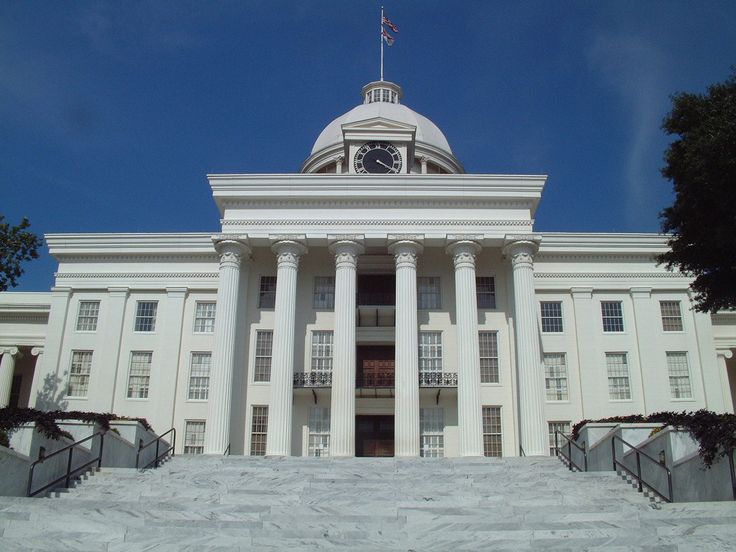
Alabama’s electors will meet at the Alabama Capitol on Monday to cast their ballots for President Donald Trump. A noontime ceremony in the old House chamber will include music, speeches and an actor portraying Uncle Sam. Nine people selected as electors last month will officially cast their ballots for Trump during the event. The secretary of state’s office says the Alabama Republican Party plans to livestream the ceremony since the Capitol is closed to the public because of the global pandemic. The Republican incumbent lost to Democratic challenger Joe Biden nationally, yet he carried Alabama easily. Republished with the permission of the Associated Press.
Martha Roby: An accurate 2020 census
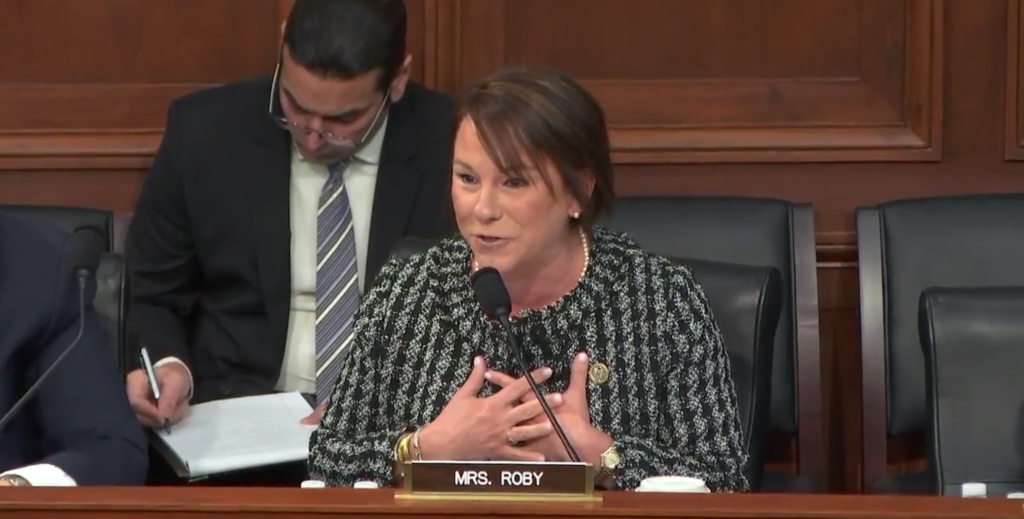
Every ten years, the U.S. Census Bureau conducts a count of every resident in the United States, as mandated by Article I, Section 2 of our Constitution. This action is critically important to understanding current facts and figures about our country’s people, places, and economy. It’s hard to believe that a decade has almost passed, and we are just eleven months away from next year’s April 1 Census. It goes without saying that a lot has changed over the last ten years, especially on the technological front. As times and trends change, it is important that the method by which we conduct the Census also evolves to ensure we are reaching the most people possible. That said, it’s no surprise that in 2020, we will largely depend on an Internet system to count Americans, relying heavily on digital advertising and social media platforms to spread the word. As the Census Bureau works to modernize its various platforms ahead of the 2020 Census, I was glad to hear about these efforts directly from Dr. Steven Dillingham, Director of the U.S. Census Bureau, during a recent Commerce, Justice, Science, and Related Agencies Appropriations Subcommittee hearing. During this hearing, I had the opportunity to discuss with Director Dillingham how important it is that all Alabamians be accurately counted in 2020. Back in 2010, our state did not do a great job accounting for all of our people, especially children below the age of six and those individuals in rural communities. As I told Director Dillingham, we must make sure that is not the case in next year’s count. You see, the Census doesn’t just decide the number of congressional seats Alabama has, it also decides our number of Electoral College votes. We currently have nine Electoral College votes, and if the 2020 Census is not accurate, that number will drop to eight. This is a very big deal, and it is something we Alabamians do not want to see happen. The Census also determines the amount of federal dollars that come into Alabama, specifically to hospitals, job training centers, schools, infrastructure projects, and other emergency services. Inaccurate Census numbers force our state to do more with less, and that cannot happen again in 2020. As we all know, Alabama’s Second District and the rest of the Southeastern corner of the state are made up of very rural communities. To achieve the most accurate count possible in next year’s Census, it is critical that we reach the men, women, and children living in the rural areas throughout the country. During my conversation with Director Dillingham, I asked him how the Census Bureau plans to use its resources to partner with our state and community-based organizations to encourage participation in the Census, especially in hard-to-count, rural communities. I made sure Director Dillingham understands that a large part of our district, and many areas of our state, lack access to reliable broadband and thus may not utilize the Internet and social media enough to encounter online advertising about the upcoming Census. This will certainly be a challenge, but it is one we must address. I also brought up another challenging reality that we must face: Over the last year, Alabama and other states in the Southeast have been beaten with hurricanes, tornadoes, and other powerful storms. There has been flooding throughout the Midwest and fires ravaging California. These disastrous events have caused thousands of Americans to be displaced from their homes, and we must ensure that they, too, are counted in next year’s Census. To make sure the 2020 Census is as accurate as it can possibly be, it is important that leaders on all levels of federal, state, and local governments are communicating about ways we can spread the word and reach the most people. I believe the modernization of our Census process will lead to excellent results next year, but it is critical that we make every effort to reach those who have been displaced by severe weather as well as the people in rural communities who may not have reliable access to social media and online advertising. The future of our state’s representation in Congress and the Electoral College are at stake, and we must ensure that Alabama receives its fair share of federal funding for numerous programs we all depend on. I encourage you to start spreading the word about the April 1, 2020, Census. It will be here before we know it, and Alabama needs an accurate count.# Martha Roby represents Alabama’s Second Congressional District. She lives in Montgomery, Alabama, with her husband Riley and their two children.
Darryl Paulson: President ‘Pants on Fire’
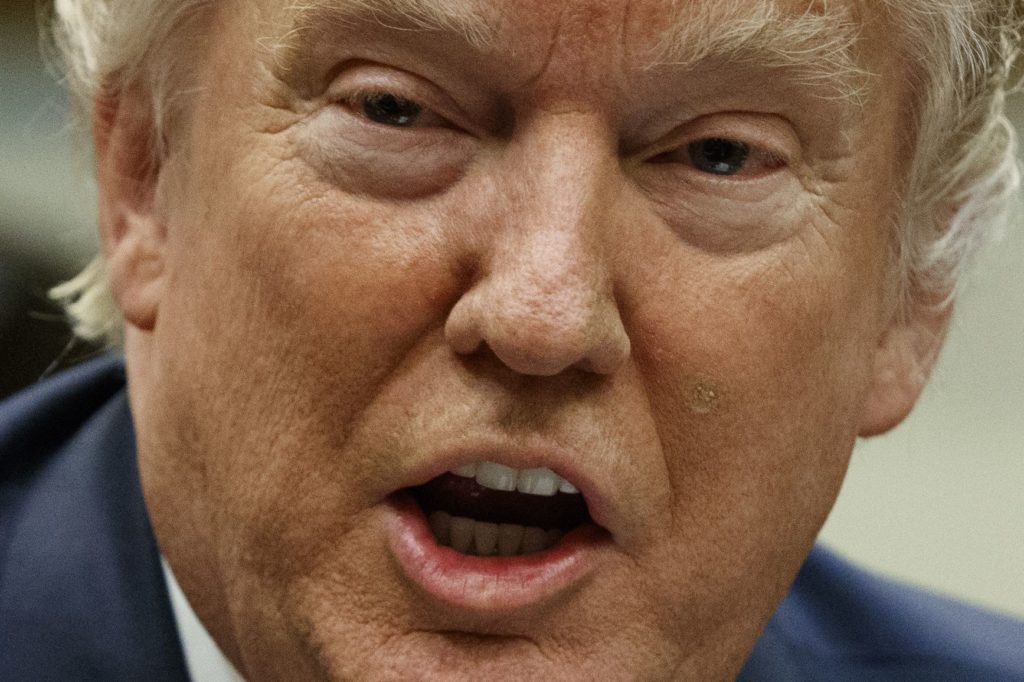
Although a Republican and a conservative, I was never able to support Donald Trump for president for three reasons. First, he has seldom been a Republican in his lifetime. Second, he is a pragmatist and populist, but not a conservative. Finally, he has difficulty telling the truth. So, what was so appealing about Trump that he won 30 of the 50 states and a majority of the electoral vote? His greatest appeal was being a non-politician in an era where Americans demanded political change. Politics is the only occupation where experience is a negative. The next time you or a loved one needs major surgery, will you pick an experienced doctor or one who is doing his first operation? Only in politics do we prefer someone with no experience. We are now reaping what we have sowed. How can you tell if Donald Trump is not lying? See if his lips are closed. Trump has changed virtually every major political position he has held. He then denies doing so, or says that changing positions is a sign of his flexibility. There is nothing wrong with a politician who changes their position, but it is not unfair to expect that person to remain true to their core values. As New York Times columnist David Brooks has written, Trump is the “most dishonest person to run for high office in our lifetime.” Trump “is oblivious to accuracy.” During the presidential campaign, Trump lied about President Barack Obama not being born in the United States; he lied about his own position on the Iraq War; he lied about NATO; he lied about Ted Cruz’s father being involved in the assassination of President Kennedy; he lied about the unemployment and crime rate; he lied about voter fraud in elections, and he lied about his groping of women. The list is far more extensive than this. Once assuming the presidency, President Trump lied about President Obama tapping his phones; he lied about his winning the Electoral College vote by historic margins; he lied about his inaugural crowds being larger than Obama’s, and he even lied about the provisions of his American Health Care Act. Trump’s constant inability to tell the truth led PolitiFact to call Trump’s misstatements during the 2016 presidential campaign to be the “lie of the year.” PolitiFact concluded that 76 percent of Trump’s statements were False, Mostly False or Pants on Fire. Lest one concludes that PolitiFact is merely another liberal hatchet job by the left-leaning media, PolitiFact labeled President Obama’s statements that “if you like your health care plan, you can keep your plan,” and “if you like your doctor, you can keep your doctor” to be the “lie of the year” after passage of Obamacare. Trump’s latest lie is that he fired FBI Director James Comey because he mishandled the investigation into Hillary Clinton’s emails. Comey was in the third year of a ten-year term as FBI Director when fired by the president. The long-term was designed to protect the FBI Director from political interference from the White House and Congress. During the last few weeks of the presidential campaign, Trump praised Comey for reopening the investigation into Clinton’s emails against strong protests from the Democrats. Trump said, “it took a lot of guts” for Comey to reopen the investigation and, in doing so, Comey had “brought back his reputation.” Comey was currently investigating potential ties between the Trump campaign and Russian influence in the presidential election. Five members of the Trump campaign have been found to have contact with Russian officials during the presidential race. The list includes former Trump campaign manager Paul Manafort, consultant Roger Stone, foreign policy adviser Carter Page, national security adviser Michael Flynn and current Attorney General Jeff Sessions. Corey’s dismissal puts the Trump-Russian investigation in jeopardy. Democrats are suspicious of the timing of Comey’s firing, but their position is weakened by their repeated called for Comey’s ouster. Perhaps the most consistent aspect of the Trump campaign and presidency is Trump’s lies. As bad as those lies may be, what is worse is that Trump is attempting to place himself above the law. Americans would not tolerate that behavior during Watergate, when both Republicans and Democrats joined forces to find out the truth. As Howard Baker said during the Watergate hearings, “what did the president know and when did he know it?” That question is just as relevant as it was over 40 years ago. ___ Darryl Paulson is Emeritus Professor of Government at USF St. Petersburg specializing in Florida politics and elections.
A traditional end to an unconventional presidential election
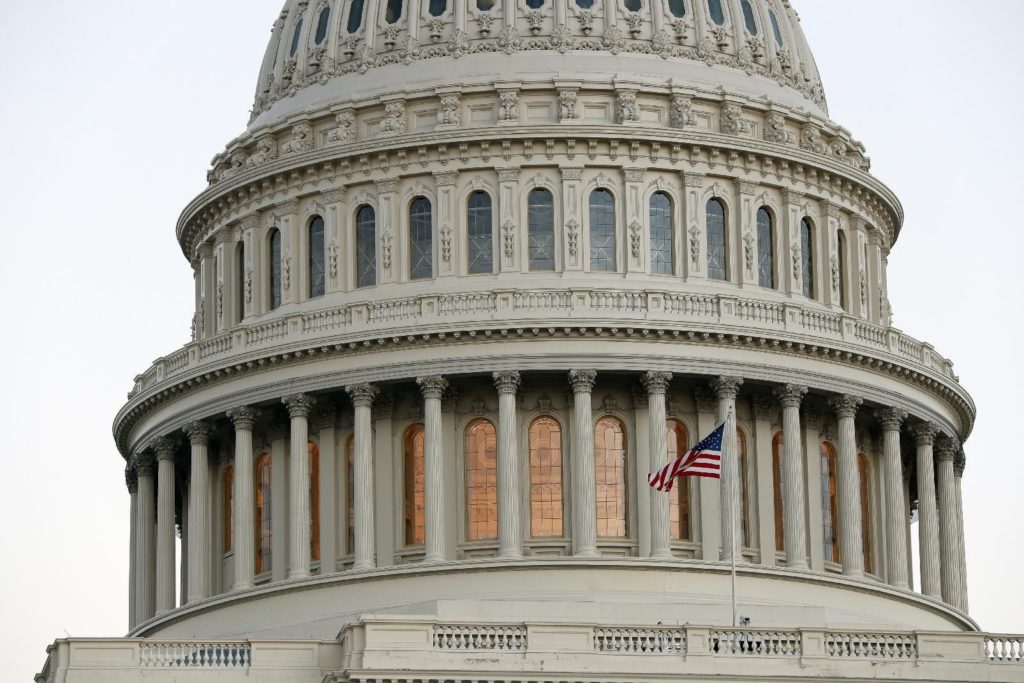
The end of the 2016 presidential election is at hand. A joint session of Congress is set to count the Electoral College votes on Friday, a traditional ending to a most unconventional presidential election. Friday’s vote count marks the last chance for Democrats and other anti-Trump forces to disrupt Donald Trump‘s election. But even if they are successful, the most Democrats could do is slow the process because they don’t have the votes to overturn the outcome. Barring something bizarre happening, Trump will be declared the winner and will be sworn in at his inauguration on Jan. 20. Vice President Joe Biden will preside over the vote count in his role as president of the Senate. All 538 electors met in their respective state capitals in December to cast their votes. Trump finished with 304 votes and Democrat Hillary Clinton with 227, according to a tally by The Associated Press. It takes 270 Electoral College votes to win the presidency. Trump won even though Clinton received nearly 2.9 million more votes. His election has generated much angst among Democrats and others who oppose the billionaire businessman. But they have been powerless to change the outcome. Despite rumblings of a revolt, only two Republican electors — both from Texas — cast protest votes for someone other than Trump. Clinton lost four Democratic electors in Washington state and one in Hawaii. The secretary of state’s office in Washington said the four “faithless” electors would be fined $1,000 apiece. During Friday’s session, Democrats will have an opportunity to file objections, questioning the validity of the vote count. Under federal law, if at least one senator and one House member object to the vote from any state, the House and Senate would meet separately to debate the merits of the objection. Several House Democrats have talked about filing an objection, but no senator has publicly backed the idea. Regardless, with Republicans controlling both chambers, any objection would have little chance of affecting the outcome. Rep. Ed Perlmutter, D-Colo., considered objecting but said, “This is not about trying to stop Donald Trump from becoming president.” Perlmutter said he wants to register his objection to Russia after U.S. intelligence community findings that Moscow engaged in computer hacking to sway the election in favor of Trump. America’s top intelligence official told Congress on Thursday that Russia undoubtedly interfered in the 2016 presidential election. “We cannot allow a foreign nation to ever influence our elections because it harms our liberty, freedom and independence,” Perlmutter said in a statement. “This is bigger than just one election, and for the sake of our democracy, we must remain vigilant.” Trump has not fully embraced the findings of the intelligence community. In fact, he has repeatedly mocked America’s intelligence officials. This week, Trump went on Twitter to question why an intelligence briefing he is to receive was delayed. However, intelligence officials said there had been no delay. Still, Trump wrote: “The ‘Intelligence’ briefing on so-called ‘Russian hacking’ was delayed until Friday, perhaps more time needed to build a case. Very strange!” Republish with permission of The Associated Press.
Donald Trump cruises to Electoral College victory despite protests
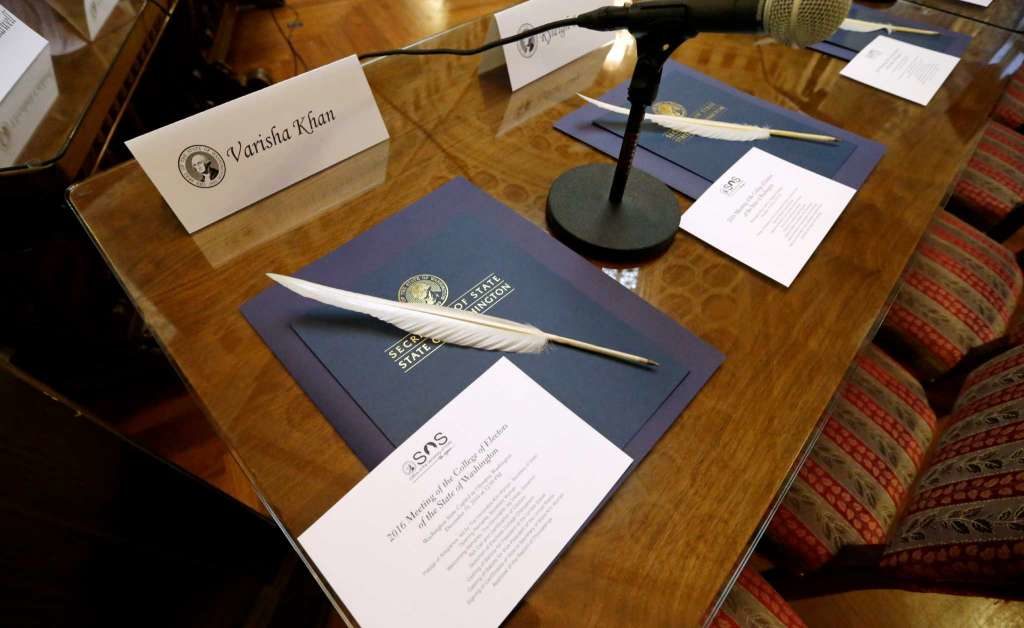
There were many protesters but few faithless electors as Donald Trump won the Electoral College vote Monday – ensuring he will become America’s 45th president. An effort by anti-Trump forces to persuade Republican electors to abandon the president-elect came to practically nothing and the process unfolded largely according to its traditions. Trump’s polarizing victory Nov. 8 and the fact Democrat Hillary Clinton had won the national popular vote had stirred an intense lobbying effort, but to no avail. “We did it!” Trump tweeted Monday evening. “Thank you to all of my great supporters, we just officially won the election (despite all of the distorted and inaccurate media).” Even one of Trump’s fiercest Republican rivals, Ohio Gov. John Kasich, said it was time to get behind the president-elect. “We want unity, we want love,” Kasich said as Ohio’s electors voted to back Trump at a statehouse ceremony. Kasich refused to endorse or even vote for Trump in the election. With Hawaii still to vote, Trump had 304 votes and Clinton had 224. It takes 270 Electoral College votes to win the presidency. Texas put Trump over the top, despite two Republican electors casting protest votes. Befitting an election filled with acrimony, thousands of protesters converged on state capitols across the country Monday, urging Republican electors to abandon their party’s winning candidate. More than 200 demonstrators braved freezing temperatures at Pennsylvania’s capitol, chanting, “No Trump, no KKK, no fascist USA!” and “No treason, no Trump!” In Madison, Wisconsin, protesters shouted, cried and sang “Silent Night.” In Augusta, Maine, they banged on drums and held signs that said, “Don’t let Putin Pick Our President,” referring to Russian President Vladimir Putin. Despite the noise outside state Capitols, inside, the voting went pretty much as planned. In Nashville, Tennessee, one audience member tried to read out some Scripture before the ballots were cast, but was told he could not speak. “We certainly appreciate the Scripture,” State Election Coordinator Mark Goins said from the podium. “The answer is no.” With all Republican states reporting, Trump lost only the two electors in Texas. One voted for Kasich, the Ohio governor; the other voted for former Texas Rep. Ron Paul. Clinton lost four electors in Washington state – three voted for former Secretary of State Colin Powell and one voted for Native American tribal leader Faith Spotted Eagle. Several Democratic electors in other states tried to vote for protest candidates but they either changed their votes to Clinton or were replaced. The Electoral College has 538 members, with the number allocated to each state based on how many representatives it has in the House plus one for each senator. The District of Columbia gets three, despite the fact that the home to Congress has no vote in Congress. Republican electors were deluged with emails, phone calls and letters urging them not to support Trump. Many of the emails are part of coordinated campaigns. In Baton Rouge, Louisiana, elector Charlie Buckels reached out to Trump’s opponents after the New York businessman got all of the state’s eight votes. “For those of you who wished it had gone another way, I thank you for being here,” said Buckels, the state GOP finance chairman. “I thank you for your passion for our country.” There is no constitutional provision or federal law that requires electors to vote for the candidate who won their state – though some states require their electors to vote for the winning candidate. Those laws, however, are rarely tested. More than 99 percent of electors through U.S. history have voted for the candidate who won their state. Of those who refused, none has ever been prosecuted, according to the National Archives. Some Democrats have argued that the Electoral College is undemocratic because it gives more weight to less populated states. That is how Clinton, who got more than 2.8 million more votes nationwide, lost the election to Trump. Some have also tried to dissuade Trump voters by arguing that he is unsuited to the job. Others cite the CIA’s assessment that Russia engaged in computer hacking to sway the election in favor of the Republican. “When the founders of our country created (the Electoral College) 200-plus years ago, they didn’t have confidence in the average white man who had property, because that’s who got to vote,” said Shawn Terris, a Democratic elector from Ventura, California. “It just seems so undemocratic to me that people other than the voters get to choose who leads the country.” A joint session of Congress is scheduled for Jan. 6 to certify the results of the Electoral College vote, with Vice President Joe Biden presiding as president of the Senate. Once the result is certified, the winner – almost certainly Trump – will be sworn in on Jan. 20. Republished with permission of The Associated Press.
All 9 Alabama electors cast their votes for Donald Trump
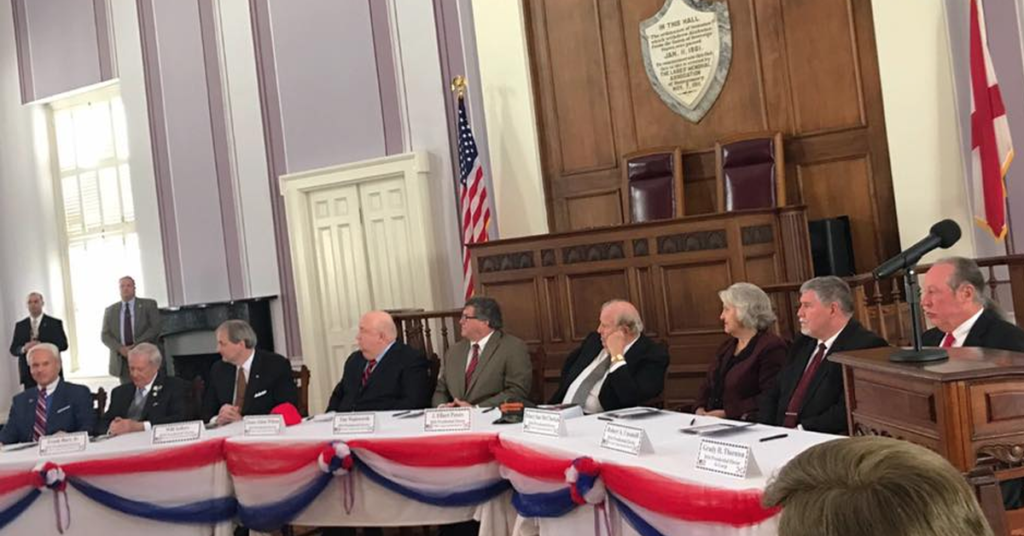
Several dozen protesters took to the steps of the state Capitol on Monday seeking to persuade Alabama’s presidential electors to cast ballots for someone other than Donald Trump. Over the last few weeks, electors in Alabama and other states have been inundated with calls, emails and letter urging them to reject Trump. But the protests were mostly symbolic in the Yellowhammer State as Trump overwhelmingly delivered the state during the general election last month, having received 1.3 million votes — roughly 62 percent of the vote. Meanwhile Democratic presidential nominee Hillary Clinton only took home 34 percent of the vote, with remaining votes divided between write-in candidates, Libertarian Gary Johnson and Green Party nominee Jill Stein. “The people of Alabama put their trust in these electors to represent the will of the people and the voice of the people of this great state in the electoral process,” Gov. Robert Bentley said before the electors cast their votes. And during an elaborate ceremony within the Montgomery-capitol, all nine of the electors voted for Trump. “Let the record show that the president-elect received more votes for the presidency than any candidate in the history of Alabama,” said Secretary of State John Merrill, who presided over the 30-minute ceremony before later certifying the vote. Watch the full electoral ceremony below: https://www.youtube.com/watch?v=H6UyVRw1U3I
GOP electors cite rural voice in Electoral College
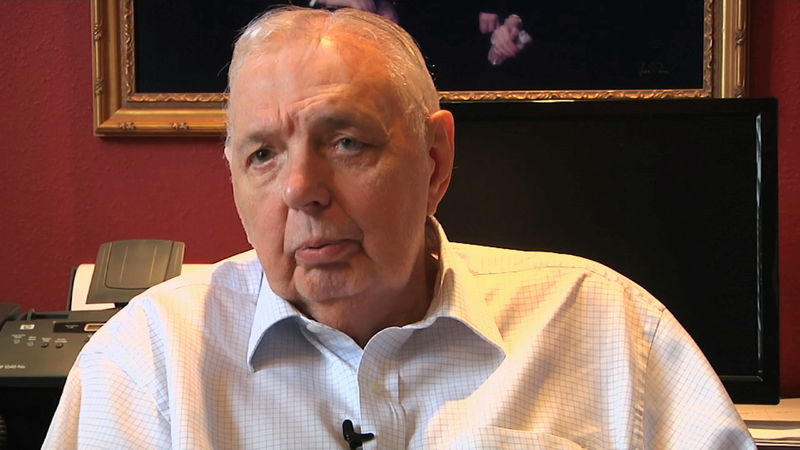
As members of the Electoral College prepare to choose Donald Trump as the 45th president of the United States, some Republican electors say they are defending rural and small-town America against big-state liberalism and its support for national popular vote leader Hillary Clinton. But the picture is more complicated. “Our Founding Fathers established the Electoral College because those larger states, those larger areas, don’t necessarily need to be the ones that rule,” said Mary Sue McClurkin, a Republican elector from Alabama. In Trump’s hometown of New York City, which Clinton won easily, Democratic elector Stuart Appelbaum countered that “we’re electing the president of the entire country,” so “the will of the entire country should be reflected in the results.” It’s an expected argument given the unusual circumstances of the 2016 election. Clinton won some 2.6 million more votes than Trump in the nationwide tally. But Trump is line to get 306 of the 538 electoral votes under the state-by-state distribution of electors used to choose presidents since 1789. Trump won rural areas, small towns and many small cities, including in states Clinton carried. Clinton won in the largest urban areas, including in Trump states. Former Alaska Gov. Sean Parnell, a GOP elector, said Democrats’ strength on the coasts is enough to justify the Electoral College. “A presidential election decided each time by either California or New York,” he said, would leave voters in Alaska and many other places “with no voice” in presidential politics. It’s worth noting that Trump didn’t just win small states and Clinton didn’t just take large ones. Trump and Clinton split the six most populous states, each winning three, but Trump won seven of the top 10. Of the 10 smallest states plus the District of Columbia, Trump edged Clinton 6-5. Trump actually ran up his national advantage in midsize states. But the dynamics highlight the delicate balance in a political structure that defines itself simultaneously as a democracy and a republic. When the Constitution was written, some signers wanted direct election of the president. Others wanted state legislatures or Congress to choose the executive. The Electoral College was the end result: Each state got a slate of electors numbering the same as its delegation in Congress. Electors vote, with rare exception, for whichever candidate won the most votes in their state – effectively meaning the presidential election is 51 separate popular votes. “It’s such an interesting compromise that gave us the Electoral College, unique to our American system,” said elections law expert Will Sellers from Alabama, who will serve as a Republican elector for the fourth time. The system gives smaller states an advantage: The number of electors is based on each state’s number of U.S. representatives plus two, for each member of the U.S. Senate – itself a compromise favoring small states. So California’s 55 electoral votes reflect 53 House members and two senators. For seven states, including Wyoming, Delaware and the Dakotas, those extra two electoral votes bring their total to the minimum of three. Put another way, Alaska’s three electors will cast 0.56 percent of the 538 electoral votes despite casting just 0.23 percent of the national popular vote. But the advantage doesn’t just favor Republicans. Democratic Nevada makes up 1.12 percent of the Electoral College but cast less than 1 of a 100 national ballots. The Electoral College-popular vote split, along with Trump’s larger-than-life personality and lack of elective experience, has fueled a vocal, but almost certainly futile, movement to deny him the presidency by pressuring electors to vote against him when they convene Monday in the 50 states and Washington, D.C. The Associated Press tried to reach all 538 electors and was able to interview more than 330 of them. Many reported getting tens of thousands of emails, calls and letters asking them to vote against Trump. But the canvass found overwhelming support for the system, and the nominee, among Republican electors. The AP found only one pledged to Trump who will refuse to vote for him. “I feel like the Electoral College gives a very fair perspective, so that those who are in the rural areas are able to have an equal voice with those who are in the urban areas,” said Oklahoma elector Lauree Elizabeth Marshall. If anything, when Republican electors talk about large states, they actually mean New York and California. Clinton’s lead in California, the most populous state, is more than her national lead. She won New York by about 1.7 million votes. McClurkin, the Alabama elector, says many of the letters and emails she’s received have come from those two states. “I’ve not gotten any from a Southern state,” she said. But Democratic elector Eric Herde from Washington state argued that the country should scrap electoral votes in favor of the national ballot count. All Electoral College defenses, whether citing population or the genius of the founders, amount to “states mattering more than people,” Herde said. “The argument that the person who got the most votes should win is still the better argument.” Republished with permission of The Associated Press.
US elector demands briefing on Russia election interference

Weeks after Hillary Clinton lost the presidential election to Donald Trump, some of her loyal supporters have not given up hope. Clay Pell, a vocal supporter of the Democrat during her long campaign and one of the 538 members of the Electoral College, said the process has been tarnished by Russian interference. He is leading a push for electors to be given more information about it before casting their votes Monday. Tradition holds that electors meet in their respective states and formally cast their votes without attracting much attention, but this year is “so beyond the normal bounds,” said Pell, one of Rhode Island’s four Democratic electors. “We as electors have a narrow role, but nonetheless it’s a role in protecting the integrity of the election,” Pell said in an interview this week, noting his past work in the Obama administration as a strategic planning director for the White House National Security Council. On Thursday, the Obama administration suggested that Russian President Vladimir Putin personally authorized the hacking of Democratic officials’ email accounts in the run-up to the presidential election and said it was “fact” that such actions helped Trump’s campaign. The White House also assailed Trump himself, saying he must have known of Russia’s interference. “Only Russia’s senior-most officials could have authorized these activities,” White House spokesman Josh Earnest said, repeating the words from an October U.S. intelligence assessment. Pell said he began talking with electors around the country several weeks ago to gauge their thoughts about the process. Some Democrats had proposed thwarting Trump by joining Republicans in choosing a more moderate Republican alternative, such as Ohio Gov. John Kasich, but Pell called those efforts “hypothetical.” “There are really so many Trump electors. It really depends on some of the Trump electors wishing to do something different and I haven’t heard or seen that,” he said. “The voters of Rhode Island voted for Hillary, so that is the way I would expect to vote, and do plan to vote,” he said. “If there were a real change, I’m sure people would look at that. That hasn’t been the case.” An Associated Press survey of the electors found little appetite for such an insurgency. Only one of the Republicans interviewed by the AP said he would vote against the president-elect. Trump won 306 electoral votes last month, well above the 270 he needs to make him president. Although Democrats in Pell’s tiny state went for Vermont Sen. Bernie Sanders in the primary, Pell’s support for Clinton, the former secretary of state, has been unwavering. Pell’s wife, the Olympic gold medalist figure skater Michelle Kwan, was a prominent Clinton campaign surrogate. His grandfather, the late Democratic U.S. Sen. Claiborne Pell, is the namesake behind the federal government’s college financial aid Pell Grants that Clinton promised to protect. Pell is a lieutenant commander in the U.S. Coast Guard Reserve with his own political aspirations. He was the third-place Democratic primary candidate for Rhode Island governor in 2014, and has held several jobs in the Obama administration. When news broke late last week of the CIA’s conclusion that Russia likely sought to influence the U.S. election on behalf of Trump, Pell and nine other electors – all but one of them Democrats – quickly crafted and published an unprecedented letter to U.S. Director of National Intelligence James Clapper demanding a briefing. Their letter, now with dozens of signatures, described the Electoral College as a deliberative body whose members have more than an “empty or formalistic task” to summarily cast their votes. “There’s been an attack on the integrity of the United States,” Pell said this week. “As a person with a background in national security, I take that very seriously.” Republished with permission of The Associated Press.
Electoral College has had tie votes, hanging chads, chaos
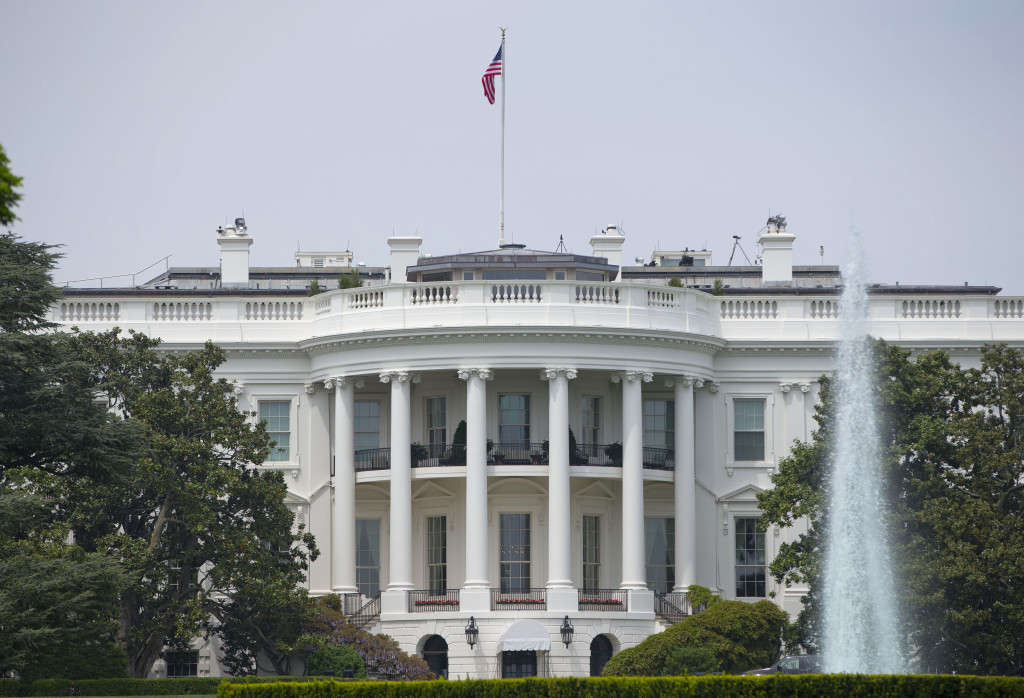
The Founding Fathers set up the Electoral College to ensure a well-informed, geographically diverse group of electors would choose the nation’s presidents. That sounds rational – and sometimes it even works. But the history of the Electoral College also includes tales of tie votes, hanging chads, conniving politicians and intrigue. A look at four elections when controversy reigned: 1800: THE TIE It’s the last thing you want in an election: a tie. The framers of the Constitution didn’t quite think that through when they failed to provide for separate ballots for president and vice president. Under the original Electoral College system, the top vote-getter was to become president and the runner-up would become vice president. In the 1800 election, Thomas Jefferson and Aaron Burr ran in tandem, with Jefferson the presumed head of the ticket. Each got 73 votes in the Electoral College. The tie threw the election to the House and set off months of maneuvering and mischief. It took the House – then with members from 16 states – 36 ballots over seven days in 1801 to elect Jefferson president and Burr his vice president. To avoid a repeat, the 12th Amendment was ratified in 1804, specifying that electors would vote separately for president and vice president. The 1800 election marked the first peaceful transfer of power between political parties in U.S. history. 1824: HOUSE CALL – AGAIN Andrew Jackson came out of the 1824 election with the most popular and electoral votes after a four-way campaign. But Jackson’s 99 electoral votes were well shy of the 131 then necessary to become president. With that, the election went to the House. House Speaker William Clay, the fourth-place finisher, was eliminated because the Constitution limits the choice to the top three candidates. With no rules for the House balloting, the chamber decided that each state’s vote should reflect the preference of the majority of its congressmen. Deal-making, backroom lobbying and bitter recriminations quickly commenced. Clay, out of the running, was determined to serve as kingmaker, and threw his support to John Quincy Adams, who had finished second. Rumors swirled that Clay had been promised the State Department in return. In the end, the deciding ballot came down to New York’s Stephen Van Rensselaer, who voted for John Quincy Adams on the first ballot and sent him to the White House. Rensselaer said he’d noticed a ballot for Adams on the floor when he bowed his head to pray, and took it as a sign from heaven, according to an account by Norman Ornstein in the book “After the People Vote.” Clay was later named secretary of State. Jackson was incensed, writing to friends, “Was there ever such a barefaced corruption in any country before?” Four years later, Jackson got his revenge when he defeated Adams. 1876: ‘HIS FRAUDULENCY’ Anyone remember Samuel Tilden? In 1876, he thought he’d been elected president. Tilden, the Democratic governor of New York, won the popular vote that year but Ohio Gov. Rutherford B. Hayes claimed the presidency based on electoral votes. At first it looked like Tilden had things sewn up: He led 184 to 165 in electoral votes with 20 votes outstanding and 185 required to win. Hayes went to bed on election night thinking he’d lost. But Republican Party leaders put pressure on electors in the remaining states, and South Carolina, Florida and Louisiana each sent conflicting electoral returns to Washington. Months of controversy ensued, with charges of bribery, forgery and ballot-box stuffing on both sides. President Ulysses Grant dispatched troops to keep the peace as votes were tabulated. It took a special bipartisan electoral commission to settle matters, with Hayes ultimately elected by a margin of one electoral vote. Hayes’ mandate was so narrow that he was called “His Fraudulency.” He kept the promise he made in his inaugural address to serve only one term. Tilden urged his supporters to recognize Hayes as the legitimate president but “nonetheless believed until his death that he had been duly elected president,” according to Ornstein’s account. To avoid a rerun of that mess, Congress passed legislation giving states authority to determine the validity of their electors. In the future, a majority of both houses of Congress would be required to reject electoral votes. 2000: 537 VOTES Vice President Al Gore won the national popular vote by more than a half-million ballots over George W. Bush in the 2000 presidential contest, but was defeated in the Electoral College after the Supreme Court stopped a hotly debated recount in Florida. Bush claimed 271 electoral votes – just one vote more than needed to prevail – after he was certified as the winner in Florida by a scant 537 votes. It took until Dec. 12, more than five weeks after Election Day, to reach that conclusion. The Supreme Court said the Florida recount violated the Constitution’s Equal Protection Clause because counties were allowed to set their own standards for determining whether to count a vote. As the laborious recount of punch-card ballots played out, “pregnant chad” entered the political lexicon. The punch cards – and their chads – have since been banned in Florida. It was all a fresh reminder of the Founding Fathers’ complicated plan for picking presidents. Republished with permission of The Associated Press.
The Electoral College class of 2016

The sharp divisions left by last month’s presidential election have cast more attention than usual on the Electoral College. The Associated Press attempted to talk to all 538 electors to get an idea of the pressure they are under, what they think about their Constitutional duty and what they make of longshot efforts to derail Donald Trump‘s ascension to the White House when they meet Monday. Here’s a sampling: Republican Rex Teter, 59, a music teacher and preacher in Pasadena, Texas, received about 35,000 emails and 200 letters urging him not to support Trump. It took him several hours to delete them the day after Thanksgiving. A Marco Rubio supporter in the primaries, he is solidly for Trump. “Some have been very personal letters. Some threatening. One was very funny. They view President-elect Trump as a threat so it’s personal for them, and I can empathize. But I’m not changing my vote as an elector.” “When I decided to run for elector, that’s when I decided to vote for Trump. I could not be an elector and not vote for Trump. … No matter of arm-twisting or any amount of money would get me to change. I was also bound by a higher law, because I promised but also because I made a higher pledge before God.” — Democrat Raymond Cordova, 77, of Garden Grove, California, thinks the Electoral College is an anachronism, but electors have an obligation to carry on the tradition of ratifying their state’s popular vote. In the primaries, he voted for Bernie Sanders. “During the time of (James) Madison I think they were right on target with it. We have the means, with sophisticated communication, all these things today, we don’t need the Electoral College. But it will never change, it will always be there.” “I honestly believe if Bernie Sanders had been the nominee, we’d have had a whole different story. But I’m not going to cry over spilled milk, I’m going to pick up my marbles and start all over again.” — Kirk Shook, 32, is an Athens, Georgia, teacher and secretary of the state GOP, who says he’s sent more than 47,800 emails about his duty as an elector to his spam folder. “Even if I could have been swayed a little bit, this has caused me to be even firmer in my resolve if just to aggravate them. It’s been a complete thorn in my side. They’re from all over the country.” “On the whole, the American people knew who they voted for. Nothing going to come out about Donald Trump, I think, that would sway the people who voted for him to change their vote or change electors’ decision.” — Democrat David Mulinix, 66, of Kaneohe, Hawaii, is exasperated with the Democratic National Committee, the Electoral College system and the fact he can do little except cast his electoral vote for Hillary Clinton according to the rules. “Now we have Donald Trump because the DNC manipulated the system to put in the worst candidate possible that the people of the United States did not want. So now we’re stuck with Trump. So I’m not sure what else to do about that. I wish there’d be some way to make a statement saying you guys really messed up … and I just don’t know exactly how to do that.” “If there was some way to change the election, then I’d be on the phone hot and heavy calling people.” “We need to get rid of this dumb thing. I really am not happy about being an elector or that this thing exists. This is really terrible. We’re supposed to have a democracy… Right now, if all the electors got together and held a conference, and said you know what, we’re going to vote for like Donald Duck, they can just do that.” — Alberto Gutier, 77, director of the Arizona Governor’s Office of Highway Safety and the state GOP’s sergeant-at-arms, says he’s been swamped with emails, several dozen calls to his personal cellphone “and a stack of letters a foot high” about his service as a Republican elector. These are largely pleas for him to back someone other than Trump. “Forty-seven thousand, five hundred emails, that’s ridiculous, OK? And hundreds and hundreds of letters. Do you have any idea, for those stamps, how many people could have been fed for the holidays?” — Sam Shapiro, 89, of Winslow, Maine, was treasurer of the state Democratic Party for 13 years and treasurer of the state as well. He says the country should emulate Maine and Nebraska by splitting their electoral votes, moving away from a winner-take-all system. But he says the people have spoken, and he will cast his electoral vote for Clinton and not be part of any effort to deny Trump the presidency. “Trump has won. I firmly support our president-elect. All of this turmoil of trying to get people to switch their votes. First of all it won’t happen. Second of all, it puts us in a bad light.” “I served in the military and took an oath to uphold the Constitution. Trump is going to be the president, and I’ll support him, even if means being in opposition to Democrats who’re trying to make a change.” — John Harper, 73, is a former Rowlett, Texas, mayor, and a Republican elector who weighed the consequences of casting his electoral vote for someone other than his state’s presidential election winner, Donald Trump. “I struggled with that one. I want to be always morally straight, kind of a Boy Scout, you know? I’m a retired military officer. Taking an oath means a lot. When you take an oath you live up for it. I made a promise. Lacking some strong, strong evidence, I think everyone is obligated to follow through what they promise.” — Democrat Stephanie A. Miner, 46, mayor of Syracuse, New York, is taking a hard look at the system in light of the fact that Clinton won about
US judge rejects Green Party’s Pennsylvania recount case
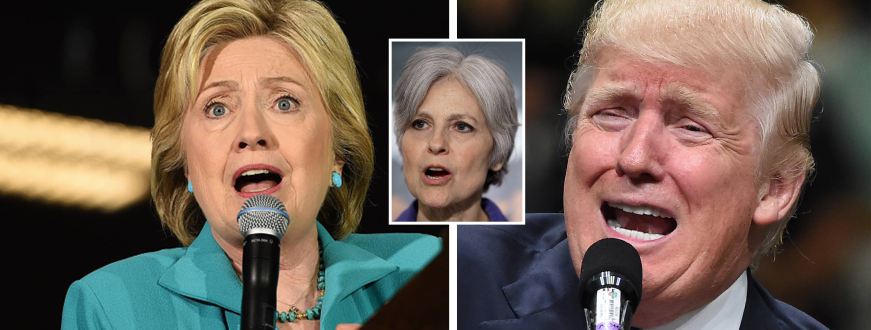
A federal judge on Monday issued a stinging rejection of a Green Party-backed request to recount paper ballots in Pennsylvania’s presidential election, won by Republican Donald Trump, and scan some counties’ election systems for signs of hacking. In his 31-page decision, U.S. District Judge Paul Diamond said there were at least six grounds that required him to reject the Green Party’s lawsuit, which had been opposed by Trump, the Pennsylvania Republican Party and the Pennsylvania attorney general’s office. Suspicion of a hacked Pennsylvania election “borders on the irrational” while granting the Green Party’s recount bid could “ensure that that no Pennsylvania vote counts” given Tuesday’s federal deadline to certify the vote for the Electoral College, Diamond wrote. “Most importantly, there is no credible evidence that any ‘hack’ occurred, and compelling evidence that Pennsylvania’s voting system was not in any way compromised,” Diamond wrote. He also said the lawsuit suffered from a lack of standing, potentially the lack of federal jurisdiction and an “unexplained, highly prejudicial” wait before filing last week’s lawsuit. The decision was the Green Party’s latest roadblock in Pennsylvania after hitting numerous walls in county and state courts. Green Party-backed lawyers argue that it was possible that computer hackers changed the election outcome and that Pennsylvania’s heavy use of paperless machines makes it a prime target. Green Party presidential candidate Jill Stein also contended that Pennsylvania has erected unconstitutional barriers to voters seeking a recount. It is part of a broader effort by Stein to recount votes in Michigan, Pennsylvania and Wisconsin. Trump won all three states narrowly over Democrat Hillary Clinton, while Stein captured about 1 percent of the vote, or less, in all three states. In Pennsylvania, Trump beat Clinton in Pennsylvania by about 44,000 votes out of 6 million cast. A federal judge halted Michigan’s recount last week after three days. The Wisconsin recount was expected to conclude Monday. With about 95 percent of the votes recounted as of Sunday, Clinton had gained 25 votes on Trump, but still trailed by about 22,000. Republished with permission of the Associated Press.
Donald Trump opponents try to beat him at the Electoral College
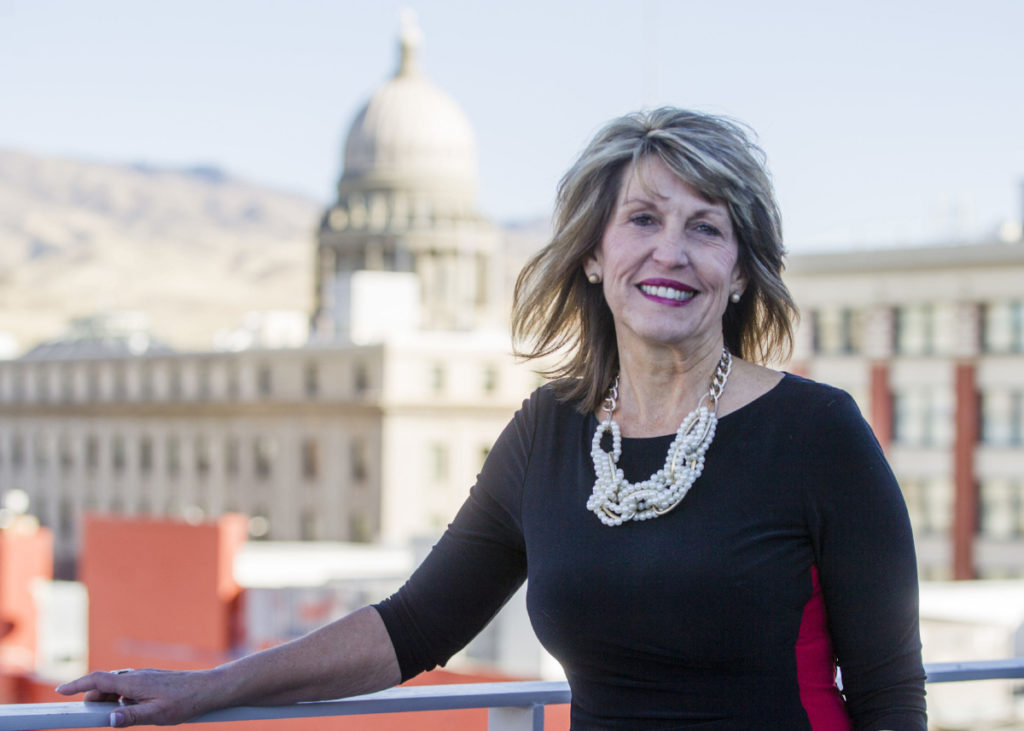
Grassroots campaigns have sprung up around the country to try to persuade members of the Electoral College to do something that has never been done in American history — deny the presidency to the clear Election Day winner. Activists are circulating online petitions and using social media in hopes of influencing Republican electors to cast their ballots for someone other than President-elect Donald Trump and deprive him of the 270 Electoral College votes needed to become the next occupant of the White House. “Yes, I think it’s a longshot, but I also think we’re living in strange times,” said Daniel Brezenoff, who created a petition in favor of Hillary Clinton and is asking signers to lobby electors by email or phone. “If it was ever plausible, it’s this year.” Trump has won 290 electoral votes to Clinton’s 232, with Michigan undecided, but Clinton is on pace to win the popular vote by at least 1 million ballots. Trump’s opponents are motivated by the outcome of the popular vote and by their contention that the businessman and reality TV star is unfit to serve as commander in chief. Just one elector so far has wavered publicly on supporting Trump. Texas Republican Art Sisneros says he has reservations about the president-elect, but not because of the national popular vote. He told The Associated Press he won’t vote for Clinton under any circumstance. “As a Christian, I came to the conclusion that Mr. Trump is not biblically qualified for that office,” he said. He said he has heard from ecstatic Clinton supporters and even supportive Republicans, but also from outraged Trump backers writing “threatening and vile things.” Sisneros signed a state party pledge to support the GOP’s standard-bearer, but that was before Trump was the official nominee. He said one of his options is to resign, allowing the state party to choose another elector. Electors are chosen by party officials and are typically the party’s most loyal members. Presidential electors are not required to vote for a particular candidate under the Constitution. Even so, the National Archives says more than 99 percent of electors have voted as pledged throughout the nation’s history. Some state laws call for fines against “faithless electors,” while others open them to possible felony charges, although the National Archives says no elector has ever been prosecuted for failing to vote as pledged. In North Carolina, a faithless elector’s vote is canceled, and he or she must immediately resign and be replaced. Layne Bangerter and Melinda Smyser, two of Idaho’s four Republican electors, said they have been flooded with emails, telephone calls and Facebook messages from strangers urging them to reconsider their vote. “It’s just not going to work,” Bangerter said. “I hope it dies down, but I don’t see that happening.” The volume and tone of the messages caught the attention of Idaho’s secretary of state, who urged the public to remain civil as electors prepare to cast their ballots on Dec. 19 while meeting in their states. Republican Party officials in Georgia and Michigan said their electors also have been bombarded with messages, and Iowa reported increased public interest in obtaining contact information for electors. Michael Banerian, 22, one of Michigan’s 16 Republican electors, said he has received death threats from people who do not want him to vote for Trump. But he said he is undeterred. “It’s mostly just a lot of angry people who don’t completely understand how the process works,” said Banerian, a political science major at Oakland University. P. Bret Chiafalo, a Democratic elector in Washington state, said he and a small group of other electors from the party are working to contact their Republican counterparts and ask them to vote for any GOP candidate besides Trump, preferably Mitt Romney or John Kasich. Under the Constitution, the House — currently under Republican control — decides the presidency if no candidate reaches the required electoral vote majority. House members choose from the top three contenders. This isn’t the first time electors have faced pressure to undo the results of Election Day. Carole Jean Jordan, a GOP elector from Florida in 2000, recalled the “unbelievably ugly” aftermath of the recount battle between George W. Bush and then-vice president Al Gore, a dispute that ended with the U.S. Supreme Court leaving Bush’s slim margin intact and handing him the presidency. Jordan said Florida’s electors were inundated with nasty letters from people saying they should not vote for Bush. Police kept watch over her home until the electors convened in Tallahassee to cast their votes. They stayed at the same hotel, guarded by security officers who also escorted them to cast their ballots at the state Capitol. Republished with permission of the Associated Press.


